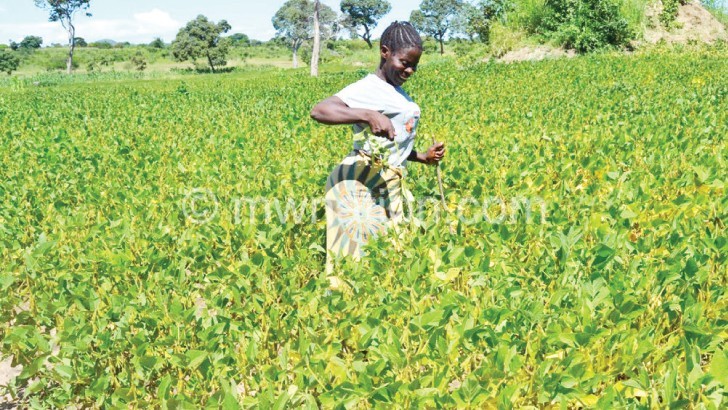Challenging stereotypes against disability
Beatrice Phiri, a humble lady living with a permanent disability in Chavunguluma Village in Traditional Authority (T/A) Chulu in Kasungu, stunned her society early last year when she pressed the leadership of Tipindule Farmers’ Club to register her.
Rural Livelihoods and Economic Enhancement Programme (Rleep) in partnership with Churches Action in Relief and Development (Card) is raising smallholder agricultural productivity to promote rural comercialisation.
Rleep, which is being financed by International Fund for Agricultural Development (Ifad) and the Malawi Government, has, for the past years, been working towards improving the incomes of economically active poor rural households and individuals engaged in the production and marketing of selected agricultural commodities through their integration with the emerging commercial sectors.

In Kasungu, Rleep is working to sustainably improve incomes of economically active poor rural households and individuals engaged in the production and marketing of soy beans through their integration with the emerging commercial sector.
Phiri says she started growing soya beans way back in 1996. She, however, concedes that her labour did not translate into the turning around of her economic fortunes.
“I blame the environment we have been operating from for this status quo. It did not enable us to commercialise the crop. We have long relied on vendors who would dictate to us at which price they want to buy our produce,” she says.
Desperate to turn her economic status around, Phiri joined Tipindule Farmers’ Club, which was purposely established to increase production and marketing of soy beans in the area.
However, her application for membership into the club was met with resistance as some members in the club suspected that she was up to something.
Phiri said some members wondered what contribution she could give as a farmer with a disability. She says most felt she could not contribute to the growth of the club and came just to ride on the success of able-bodied farmers?”
The mother of four confesses that she never expected the club to easily accept her into its fold.
She narrates: “Of course, there have been local and national efforts to mainstream disability into any sector of development, including agriculture. But this is one of the societies whose inhabitants have not yet fully appreciated that disability is not inability.”
But Phiri did not want to give up. She pressed on until her name was registered.
And as luck would have it, Phiri’s perseverance is slowly paying off. She is now one of the few farmers in Tipindule Farmers’ Club whose soy beans have done well although the area did not receive enough rains.
Card field officer Alinafe Gondwe says Phiri is among farmers who adopted new technologies such as double-row planting.
He says double-row planting boasts of a number of advantages, including ability to keep plants healthy during droughts.
“This technology gives less room to evaporation. Plants keep moisture which they use during droughts and dry spells,” says Gondwe.
He further states that double-row planting allows farmers yield twice the amount they could get if they planted in a single-row on the same land.
“As for Phiri, apart from double-row planting, she is now assured of better prices since she will sell her produce together with her friends as a group in what is called collective marketing,” he explains.
Rleep national programmes director Dixon Ngwende says with funding from Agricultural Commercialisation Fund (ACF), his programme is raising smallholder agricultural productivity and promoting rural commercialisation to enable farmers realise more from their labour.
He says: “And to achieve our goal, Rleep is working in partnership with various role players that include non-governmental organisations [NGOs], government and private sector partners. In Kasungu, our implementing partner is Card, which is identifying, mobilising and training soy bean farmers.”
Ngwende says after identification the farmers are then trained in modern farming techniques to increase their production after which markets are identified where they can sell their produce at competitive prices.
He says using modern agriculture and farming is a must adopt because modern farming methods have proven effective in increasing production and beating adverse effects of climate change.
A visit to Phiri’s one-acre farmland in Chagwa Village, proves that the lady is headed for good bucks this year, raising hopes that she will finally be able to pay school fees for her first-born daughter—things she says she would not do.
“For three times, I have failed to pay school fees of my daughter who first got selected to Chulu Community Day Secondary School. She is repeating her Standard Eight because she does not want to stay out of school. Otherwise, had I managed to raise enough from the soy bean sales in the past, she would have been in Form Two now,” she narrates.
For Phiri, the rejuvenated hope comes through collective marketing under Tipindule Farmers’ Club. She feels she will now be able to raise enough money to not only pay fees for her daughter, but also buy iron sheets for her house. n





